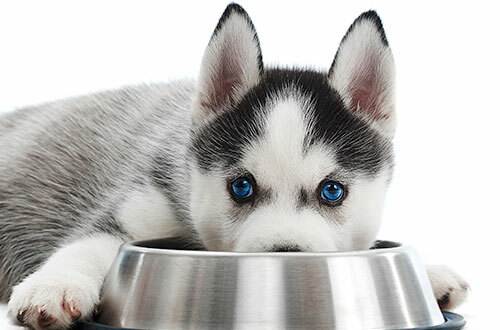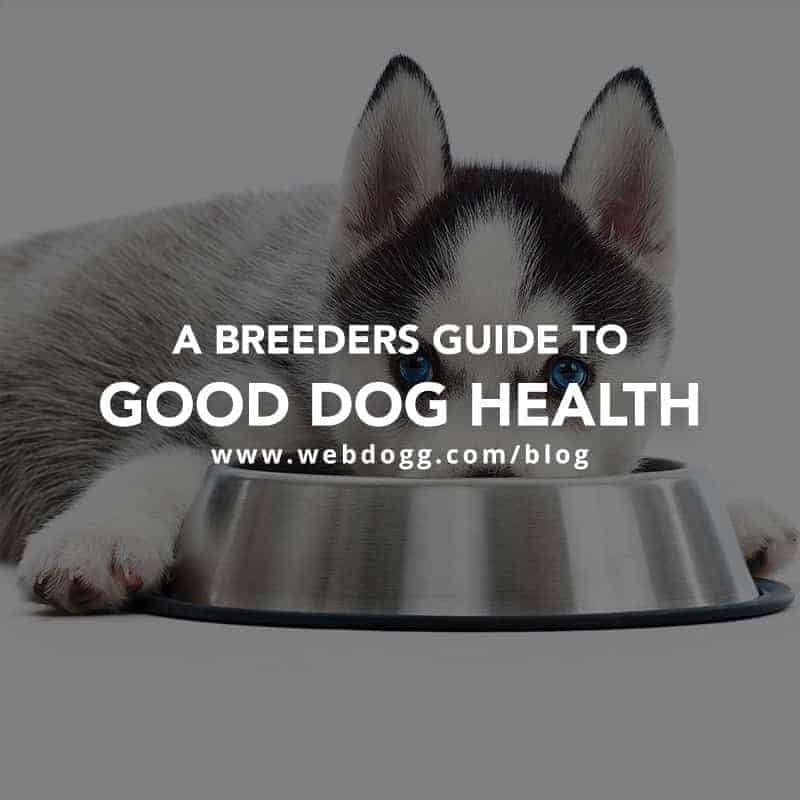A Breeders Guide to Good Dog Health
Diet and Nutrition Tips
Gabrielle Plascak CPDT-KA
Dog health is a buzzing topic in today’s society and there is much debate on what is or isn’t optimal for a dogs diet. As a breeder, it is vital that you get the facts straight not only for your current dogs but for the growth and development of your future puppies. Incorrect nutrition can lead to malnourishment causing undesired physiological effects, growth and performance delays and even death in puppies.
While this sounds intimidating it can be avoided by selecting a proper nutritious diet for your breeding dogs.
Let’s start with the basics.

It's a dog eat dog world... or is it?
Simply stated dogs are omnivores and contrary to popular belief they need a diet consisting of both meat and everything else. While a canine cannot live off of meat alone, a vegetarian hound is possible but there is definitely no reason to deprive your dog of flesh. The point is that the percentage of a dog’s macronutrient breakdown is more important than where it is coming from. A dog will thrive on any diet as long as it consists of the appropriate levels of protein, fats, carbs, minerals, and vitamins
What is my dog really eating?
If you are a feeder of dry kibble you are one of many. Dry kibble can make up a proper diet as long as you take notice of the ingredients in the food that you are purchasing. Like anything, if you want the best results to buy the highest quality you can afford but make sure the bag lists ingredients that you recognize and can preferably pronounce. An ingredients list reading whole foods that meet the suggested nutrients being 22% protein,18% fat, lower calorie, and should be a priority. (While these are general guideline the numbers can vary dog to dog)
Meat, meat by-product & meat meal oh my!
These terms have a bad rap mixed with a complete misunderstanding with most dog owners. People are advised that the best dog food selection will only state CHICKEN or BEEF as the FIRST ingredient and it should never be followed with chicken MEAL or chicken BY-PRODUCT.
The first important thing to know about dog food production is that when an ingredient list is made it is done so before the processing and done according to the weight of product going in. One would think this confirms the fact that the criteria for selection should be meat as the first ingredient listed. It’s not that simple. You see, meat contains mostly water weight and since it is being weighed before the process that breaks everything down the label may read that there is much more meat in it then there really is. This is because the water is extracted from the meat after it has been weighed to go into the food.
Meat meal is the exact same thing as meat except that it has been dried BEFORE going into the mix to be processed. So if meat meal is the number one ingredient the chances are that it holds most of the weight and protein content, or at least more so than meat alone.
Meat by-product is simply the matter left over after the meat is taken and typically doesn’t mean
feathers and beaks but organs and high protein filled parts.
It's not about the first ingredient but ALL of them.
Reading labels can be tricky because while one label could list corn as the first ingredient it actually may be superior to the one stating that chicken is the first ingredient depending on the rest of the ingredients listed. There may actually be more meat-based ingredients, vegetables, grains, and other nutrients filled sources that your dog needs to thrive.
Grain Free?
Dogs can actually digest carbs and grains and can do so even more effectively if they are cooked before consumption. Carbs can give your dog energy and just like with people they aren’t all bad for your dog. Unless your dog has a specific allergic reaction to wheat or grains, there is no point spending more money to avoid them.
Raw Diet because. . .wolves?
As stated above it is not possible for a dog to live on meat alone. There is a lot of misconception that since dogs evolved from wolves they need to eat like wolves. The thing about that is dogs evolved from wolves by eating the scraps of humans not by eating raw flesh.
Don’t get me wrong, there is nothing wrong at all with a nutritious filled raw diet but there here are a few things to keep in mind if you go down the raw diet road:
Talk to your vet – each dog has very specific needs and it would be in your best interest to discuss the raw diet with your vet before attempting to feed raw.
It cannot be only meat – make sure you are adding in the correct amounts of veggies, fruits, minerals, and vitamins.
Wash your hands! – Don’t let the care of your dog neglect the care of sanitation while food prepping.
Follow Recipes – People out there have specifically formulated raw food recipes that account for everything your dog needs nutrition wise.
While feeding a raw diet can be fun and enjoyable for the dogs there is risk involved on top of extra work and expenses to ensure the quality of diet.
Health in the mind
We have hit a lot on nutrition for the body but I want to touch base on nutrition for the mind. A dog that has his brain stimulated daily will generally have a decrease of energy, an increase of problem-solving abilities, and an overall more enriched life. You may not have hours to spend with your dogs exercising and training, especially if you are a breeder with a big operation and many dogs. A quick, easy and very successful way to create mind nutrition for your dogs is to feed their daily meals in food toys or puzzles. Kongs are great but there are also some toys you can make at home like placing food inside a muffin tin with tennis balls covering each hole.
You can also prep their regular kibble the night before by soaking in water or broth, stuffing in food toy, and freezing overnight to create a harder more intense food game. Small things like this can really activate your dog’s mind and provide unlimited benefits!
A bit more for your breeding needs:
We covered the basics of diet and nutrition for dogs but as a breeder, you want to ensure that your mother dogs are in ultimate health for the journey.
Let us take a look at pregnancy nutrition
Weight
A mother dog will healthily gain 15-20% of her weight during the course of pregnancy. Weighing regularly is a good habit to maintain a knowledge of your dog’s weight throughout pregnancy. Being both underweight or overweight while pregnant can cause many of the malnourishment issues that were mentioned above. Blood work is recommended to check levels and see where supplementation is needed to prevent these issues. It may seem a bit extreme, but if nutrition starts off wrong it can cause permanent damage even if corrected later
Mommas Macros
An ideal combination of macros for a mother dog is 29% protein and 17% fat with higher carbs and low fiber ( This is a general suggestion as the ideal numbers do vary dog to dog). Look into feeding puppy formulated food or food formulated for active dogs during the pregnancy. It is also important that the dog has sufficient calcium and phosphorus intake for milk production.
A happy balance
There are supplements you can add to your females daily diets to obtain all the extras needed but if you do so watch and make sure you aren’t supplementing anywhere else by giving a ton of added meat or milk-based treats. Overdoing the number of needed nutrients can lead to birth defects in the puppies.
Wrapping things up
Here are your main takeaways
- Speak to your vet about your dog’s overall health especially when breeding. They can make the appropriate suggestion to best suit your dogs needs.
- Don’t focus so much on what isn’t in the dog food your select but more on what IS in it.
- All macronutrients are important in your dog’s diet
- Dogs aren’t wolves so they don’t need to eat like them
- When breeding take special care in ensuring your dogs are given the proper diet and optimal nutrition for the future of the dogs to prevent growth and developmental (physically and behaviorally) issues down the road
Overall, the most important thing in your dog’s life to ensure proper health and care is having an advocate that will learn and apply knowledge to better their lives on the daily.

